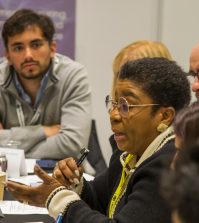The dangers of division: Singapore’s civil service chief opens Global Government Summit

At the 2019 Global Government Summit, head of the Singapore Civil Service Leo Yip highlighted the dangers of today’s global and social tensions – and the challenges around trust, technology and transformation facing government. Matt Ross reports on the event’s opening session
“All of us come from different countries, serving different governments with our own unique contexts and structures – but I’d say that we face broadly the same set of challenges around the world,” said Leo Yip. “There is much for us to learn from each other.”
Yip, head of the Civil Service of Singapore, was welcoming delegates to Global Government Summit 2019: an annual event bringing together the leaders of civil services around the world for informal, open discussion of the policy and organisational issues they share. Thirteen top officials had gathered at Singapore’s Shangri-La hotel for the discussions, representing nine countries from the Far East, Europe, North America and Australasia.
“This is your event, and it works best as a free-flowing discussion,” commented Kevin Sorkin, director of event organisers Global Government Forum. Thanking knowledge partners SAS, he explained that “there’s no chairperson, and no formal agenda beyond the session topics: we want you to focus on the issues that matter most to you.
“Just as you serve elected leaders, helping them to realise their goals, we serve you,” he added. “And having brought together the agenda, the space and the people, the best thing we can do now is get out of your way.”
Challenges: the three Ds

Identifying some of the issues that really matter to civil service leaders globally, Yip recalled that at the 2018 event he’d picked out what he’d dubbed “the four dreaded ‘Ds’: declining trust; demographic change; disillusioned electorates; and disruptive technologies.”
A year on, he continued, there are “three Ds that describe the world that we operate in, and manifest the challenges for many of the civil services around the world.”
“The first D is the dark clouds that are looming over the global economy, and which I think are becoming more evident with every passing month,” he explained. “The second D is the deep divisions – at two levels.
“First, on the international stage, where I think we can make the case that the major powers of the world are perhaps more divided than at any point in time since the end of the Cold War,” he added. “And at another level, I think we’re seeing across many countries around the world deep divisions in societies and in electorates and peoples. At the heart of this is the rise of populism and the emergence of extremist political parties; and as a result, we see the hollowing out of the political middle in many countries.”
Yip’s third D, he continued, was “the phenomenon of deglobalisation.” Until recent years, he said, free trade and economic integration were seen as the keys to boosting productivity and prosperity; but growing political and economic tensions are challenging that consensus.
“The US and China are two separate nations, but they form an integrated economic system and it makes sense for both countries to be trading as freely as possible with each other,” he said. “What we’re seeing now is the danger that this integrated system may decouple – and that would come at huge cost, not just to the US and China but also to the rest of us in this economic ecosystem.”
Solutions: the three Ts
To address these three ‘Ds’, Yip argued, civil servants must act on a number of fronts – neatly summarised under three ‘Ts’.
The first is the task of repairing public trust – addressing some of the divisions within societies, and the associated political shifts towards populism. “At the core of this problem is the fact that people’s lives and livelihoods haven’t improved for ten years,” he said: the lingering effects of the financial crisis have severely constrained income growth for millions around the world. This has resulted in “a loss of hope, of optimism in the future,” which must be addressed by restoring trust “in governments, in institutions, in political parties, and in companies.”
Yip’s second T concerned technology. Back in 1965, he noted, Newsweek magazine said of technology’s swift rise that “businesses love it, workers fear it, and governments fret and wonder what to do about it.” Reflecting on this observation some 40 years on, Yip noted that “not much has changed.”
Much as people love to adopt technology in their daily lives, it has also created massive economic and social changes – with automation and Artificial Intelligence, for example, stripping jobs out of many formerly secure industries. “Our response has to be to help people harness the potential and the opportunities of technology, whilst addressing their anxieties about its disruptive effects on their jobs and lives – as well as the challenge of other ills such as ‘fake news’,” he commented.
Adapting government

To act on these first two Ts, Yip concluded, civil services must embrace a third: that of transformation. “Many of governments’ structures, processes and capabilities were designed, developed and put in place during a very different era,” he said. “Therein lies a big challenge: how do we then transform ourselves?”
Crucially, he argued, civil services must become more agile, and act in a more coherent manner. To respond to ever more rapidly evolving societies, economies and technologies, they must develop “an agility of policy response, of delivery and of capability. We need to build this agility, transforming the ways in which we organise ourselves and serve the public.”
Meanwhile, “in the face of an increasingly uncertain, ambiguous and complex world, we need stronger coherence in policy directions, in strategy and in collaboration across the public service.” When issues demand coordinated action across the traditional boundaries of vertically-organised governments, Yip argued, civil servants must become more collaborative – building policies and services around citizens’ needs, rather than the public sector’s organisational structures.
The agenda for Global Government Summit, Yip concluded, would directly address many of these issues.
Economics, collaboration, and leadership
The first session, hosted by former UK cabinet secretary Lord O’Donnell, would cover the prospects for the global economy and the development of governments’ capacity. That would be followed by two sessions examining different aspects of cross-government collaboration – the first concerning policies and services, and the second the cross-government management of systems, platforms and data.
Following that, delegates would debate how best to develop the next generation of civil service leaders. And finally, they’d explore contemporary approaches to engaging and partnering with citizens – building means of consultation, policy development and service delivery that suit the expectations of today’s populations and the capabilities of current technologies.
Strong, intelligent leadership will be essential to meeting the issues encapsulated by Yip’s three Ds. “And the challenge is on us to mount that response in our own countries – stepping up to exercise leadership in our governments, and to provide stronger support to our political leaders,” he said. “We all have to respond in our own different ways, in our own different contexts, in our own different countries.” And in building those responses, civil service leaders have a huge amount to learn from one another: the Global Government Summit was designed to help them do just that.
This is part one of our report on the 2019 Global Government Summit, held in Singapore earlier this year. In part two, former UK Cabinet Secretary Lord O’Donnell talks about the threat of a global recession and about how governments must become more effective – repairing their economies, and reshaping public services around prevention rather than reaction. Part three focuses on how, by rebuilding departments’ work around a handful of core goals, governments can get civil servants working together across traditional boundaries. In part four, officials discuss the need for civil servants to deploy digital tech to meet citizens’ needs and improve trust in government. In part five, they debate the enterprising, collaborative form of leadership required in today’s world. And in part six, we report on the final session of the Summit, in which delegates debate the leadership, project development and public engagement skills required to rebuild services for the modern world.
Global Government Summit 2019 attendees
In alphabetical order by surname
Civil servants:
- Natalie Black, Her Majesty’s Trade Commissioner, Asia Pacific, Foreign & Commonwealth Office, United Kingdom
- Nancy Chahwan, Chief Human Resources Officer, Treasury Board of Canada Secretariat, Canada
- Stephanie Foster, Deputy Secretary, Department of Prime Minister and Cabinet, Australia
- Rosemary Huxtable, Secretary, Department of Finance, Australia
- Sirpa Kekkonen, Head of Government Strategy Secretariat, Prime Minister’s Office, Finland
- Ng Chee Khern, Permanent Secretary, Smart Nation and Digital Government, Prime Minister’s Office, Singapore
- Dato’ Haji Suhaime bin Mahbar, Deputy Director-General of Public Service (Operations), Public Service Department, Malaysia
- Gabriel Makhlouf, Treasury Secretary and Chief Executive, Treasury, New Zealand
- Gus O’Donnell, Lord and former Cabinet Secretary, House of Lords and IMF, United Kingdom
- Peter Ong, Chairman-Designate of Enterprise Singapore, Senior Economic Advisor, Ministry of Trade and Industry, Singapore
- Taimar Peterkop, State Secretary, Estonia
- Jacqueline Po, Deputy Secretary, Strategy Group, Singapore
- Mikhail Pryadilnikov, Deputy Director, Analytic Center for the Russian Government, Russia
- Dmitry Yalov, Deputy Chairman, Government of Leningrad Region, Russia
- Tan Ching Yee, Permanent Secretary, Ministry of Finance, Singapore
- Yong Ying-I, Permanent Secretary, Public Service Division, PMO, Singapore
- Leo Yip, Head of Civil Service, Singapore
Knowledge partners:
- Steve Bennett PHD, Director, Public Sector and Financial Services Practice, Global Industry Practices, SAS Institute
- Vidhya Ganesan, Partner, Digital Government, McKinsey & Company
- Giselle Ho, Head of our Government Practice, SAS Institute Singapore
Global Government Forum:
- Matt Ross, Editorial Director, Global Government Forum
- Kevin Sorkin, Chief Executive, Global Government Forum























